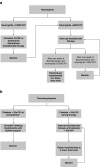Practical recommendations on the use of lenalidomide in the management of myelodysplastic syndromes
- PMID: 18265982
- PMCID: PMC2275303
- DOI: 10.1007/s00277-008-0449-0
Practical recommendations on the use of lenalidomide in the management of myelodysplastic syndromes
Abstract
Lenalidomide, an oral immunomodulatory agent, has received approval in the USA from the Food and Drug Administration (FDA) for the management of myelodysplastic syndromes (MDS) classified by the International Prognostic Scoring System (IPSS) as low risk or intermediate-1 risk and with a deletion 5q (del(5q)) cytogenetic abnormality. Although some patients with del(5q) have a relatively good prognosis, all del(5q) patients will become transfusion-dependent at some point during the course of their disease. The results of two clinical trials in more than 160 patients with MDS have demonstrated clear therapeutic benefits of lenalidomide, with >60% of patients achieving independence from transfusion during therapy, irrespective of age, prior therapy, sex, or disease-risk assessment. The recommendations presented in this review will aid the safe administration of lenalidomide for the treatment of patients with low-risk or intermediate-1-risk MDS and a del(5q) cytogenetic abnormality, and they will help physicians avoid unnecessary dose reduction or interruption, thus assuring the best efficacy for patients.
Figures
References
-
- National Comprehensive Cancer Network. NCCN Clinical Practice Guidelines in Oncology. Myelodysplastic syndromes. V.2.2008. Available from: http://www.nccn.org/professionals/physician_gls/PDF/mds.pdf. Accessed 4 December 2007 - PMC - PubMed
-
- None
- Hamblin TJ (2002) Epidemiology of the myelodysplastic syndromes. In: Bennett JM (ed) The myelodysplastic syndromes: pathobiology and clinical management. Marcel Dekker, New York, NY
-
- {'text': '', 'ref_index': 1, 'ids': [{'type': 'PubMed', 'value': '9058730', 'is_inner': True, 'url': 'https://pubmed.ncbi.nlm.nih.gov/9058730/'}]}
- Greenberg P, Cox C, LeBeau MM, Fenaux P, Morel P, Sanz G et al (1997) International scoring system for evaluating prognosis in myelodysplastic syndromes. Blood 89:2079–2088 - PubMed
-
- {'text': '', 'ref_index': 1, 'ids': [{'type': 'DOI', 'value': '10.1016/j.leukres.2006.10.023', 'is_inner': False, 'url': 'https://doi.org/10.1016/j.leukres.2006.10.023'}, {'type': 'PubMed', 'value': '17161457', 'is_inner': True, 'url': 'https://pubmed.ncbi.nlm.nih.gov/17161457/'}]}
- Olney HJ, Le Beau MM (2007) Evaluation of recurring cytogenetic abnormalities in the treatment of myelodysplastic syndromes. Leuk Res 31:427–434 - PubMed
-
- {'text': '', 'ref_index': 1, 'ids': [{'type': 'DOI', 'value': '10.1182/blood-2007-03-082404', 'is_inner': False, 'url': 'https://doi.org/10.1182/blood-2007-03-082404'}, {'type': 'PubMed', 'value': '17726160', 'is_inner': True, 'url': 'https://pubmed.ncbi.nlm.nih.gov/17726160/'}]}
- Haase D, Germing U, Schanz J, Pfeilstocker M, Nosslinger T, Hildebrandt B et al (2007) New insights into the prognostic impact of the karyotype in MDS and correlation with subtypes: evidence from a core dataset of 2,124 patients. Blood 110:4385–4395 - PubMed
Publication types
MeSH terms
Substances
LinkOut - more resources
Full Text Sources
Medical
Research Materials
Miscellaneous


